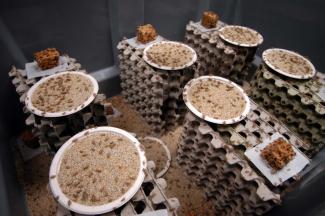Climate crisis
Smart technologies in the fight against the climate crisis

For low-income countries, the climate crisis poses a particular challenge. On the one hand, they are already being severely impacted; on the other, they have few technological or financial resources to carry out mitigation or adaptation measures. However, there are also many opportunities in sustainable economic growth with fewer emissions.
In its 2020 report, the World Economic Forum coined the term “New Nature Economy”. The idea is to reduce the resources a society needs to achieve prosperity, thereby protecting ecosystems.
New Nature Economy offers a broad spectrum of new business models that use innovative technology and attract private capital. Some are already successful. Ecotourism, a responsible and sustainable way to travel, is one well-known example. Various market research studies estimated the market size of ecotourism at around $ 180 billion in 2019, with an annual growth rate of approximately 10 to 15 %.
Insects as a source of protein
Another example is breeding insects as an alternative protein source for humans and animals. Edible insects have a similarly high protein content as meat, but rearing them uses significantly less space and energy compared to other livestock. At the moment they remain a niche product, but in the past two years, three insect species were approved for human consumption in the EU.
“Zero waste” has become a slogan on social media. This is how bakeries are springing up that bake fresh bread from old – and textile factories that recycle cotton and turn it into new clothes. Apps that broker leftover food from restaurants help to reduce food waste and thus protect the environment. Nature-based solutions like purifying water through plant-based purification systems are attracting the interest of investors. According to estimates by the World Economic Forum, the business potential of New Nature Economy is $ 10.1 trillion annually by 2030. It could also create 395 million jobs.
The advantage of digitalisation and technology
Based on these examples, it’s clear that technologies will play a leading role in the transformation to New Nature Economy. Technological advances present a major opportunity for low-income countries. They can base their growth on significantly improved technologies, whereas industrialised countries often underwent the Industrial Revolution at the expense of the environment.
According to the German Institute of Development and Sustainability (IDOS), the swift increase in emissions in low-income countries can primarily be attributed to their rising energy needs, which at the moment are still largely being covered by fossil fuels.
For a long time, high transition costs were a serious impediment to the development of renewable energies in these countries. However, the International Renewable Energy Agency (IRENA) reports that these costs have dropped significantly over the last decade, partly due to improved technologies and competitive supply chains. For example, the IRENA database shows that the cost of electricity from photovoltaic plants dropped by 85 % between 2010 and 2020, while the cost of concentrated solar power fell by 68 % and wind power by 56 % (onshore) and 48 % (offshore).
This trend is expected to continue for the foreseeable future. Clean energy is now not only affordable, but often even more competitive than fossil fuels. The transition to renewable energy sources offers enormous potential for economically weak countries – both in terms of saving costs and emissions.
However, there are some points to consider so that renewable energies can really make the greatest possible contribution to sustainable business. For example, the production of building components for renewable energy infrastructure itself requires a great deal of energy and materials. It is important to ensure that this process leaves as small a carbon footprint as possible.
The performance of power plants based on renewable energies is strongly dependent on weather conditions. For that reason, technological innovations are essential in this area to further boost storage capacity and diversify the energy mix. They are the only way to mitigate fluctuations in electricity production due to unfavourable weather conditions.
Furthermore, social and ecological aspects must be taken into account in the planning and realisation of such power plants in order to reconcile the interests of all those involved and affected. For example, people who are to be resettled because of the construction of a hydropower plant must be fairly compensated. In the case of projects like offshore wind parks or tidal power plants, the protection of marine life must be ensured.
Smart farms and driverless trucks
In addition to the transition of energy sources, digitalisation and the use of smart climate technologies is another factor for green growth, emission reduction and the mitigation of climate risks. A 2020 study by the German digital association Bitkom shows that digital technologies could save up to 20 % of global greenhouse gas emissions. The greatest potential can be found in the energy, building, mobility and transportation sectors, as well as in agriculture and industry.
Innumerable innovations are already on the way. In the logistics sector, driverless electric trucks can increase the efficiency of goods transport and reduce emissions at the same time. Thanks to the quick growth of network capacity and available data, driverless trucks can find the best route, analyse traffic situations and communicate with other vehicles. Thus they can avoid traffic jams and accidents and deliver their goods more efficiently. The use of electric vehicles lowers fossil fuel consumption, and an improved traffic flow raises the quality of life, increases traffic safety and reduces emissions.
Smart farming has become a reality as well. Digital devices can analyse weather conditions, monitor plant growth, improve irrigation efficiency and reduce groundwater consumption. Drones that spray fertiliser, for example, raise dosing accuracy, lower fertiliser consumption and therefore also emissions from fertiliser production.
Intelligent building technologies have been monitoring energy consumption in homes for some time and network technical devices there. For example, they control shading, heating and cooling systems as well as lighting and can thus optimise energy consumption.
GreenTechs like Husk Power Systems are playing an increasing role in the energy sector as well. With financial support from the German development financier DEG, Husk develops and operates low-cost hybrid power plants based on renewable energies in Nigeria and India. These so-called mini-grids make it possible to use appliances such as refrigerators, fans or water treatment plants. They are a series of electricity generators and, possibly, energy storage systems that are operated as a single system and connected to a distribution grid that provides localised electricity.
However, according to the Bitkom study mentioned above, 1.8 to 3.2 % of global greenhouse gas emissions are caused by the production of digital devices and the operation of digital infrastructure. Therefore, it is also important for digital solutions to find a healthy balance through climate-friendly hardware production and an optimised energy mix for the high energy demand of data centres and networks.
Links
World Economic Forum, 2020: New Nature Economy Report II: The Future Of Nature And Business.
https://www3.weforum.org/docs/WEF_The_Future_Of_Nature_And_Business_2020.pdf
Bauer, S. et al., 2021: Working together to achieve the Paris climate goals and sustainable development: International climate cooperation and the role of developing countries and emerging economies.
https://www.idos-research.de/uploads/media/Report_DIE_NewClimate__ENGLISH_FullReport.pdf
Bieser, J. et al., 2020: Klimaschutz durch digitale Technologien – Chancen und Risiken. Kurzstudie.
https://www.bitkom.org/sites/main/files/2020-05/2020-05_bitkom_klimastudie_digitalisierung.pdf
Tian Xia is an economist at the Deutsche Investitions- und Entwicklungsgesellschaft mbH (DEG).
tian.xia@deginvest.de
presse@deginvest.de
Nathalie Spath is a policy advisor at the Deutsche Investitions- und Entwicklungsgesellschaft mbH (DEG).
nathalie.spath@deginvest.de
presse@deginvest.de








